Hadith No. 10: Ṭayyib – A Believer's Lifestyle and His Pathway to Accepted Worship
عَنْ أَبِي هُرَيْرَةَ رَضِيَ اللهُ عَنْهُ قَالَ: قَالَ رَسُولُ اللَّهِ ﷺ:
أَيُّهَا النَّاسُ، إِنَّ اللَّهَ طَيِّبٌ لاَ يَقْبَلُ إِلَّا طَيِّبًا، وَإِنَّ اللَّهَ أَمَرَ الْمُؤْمِنِينَ بِمَا أَمَرَ بِهِ الْمُرْسَلِينَ. فَقَالَ: {يَا أَيُّهَا الرُّسُلُ كُلُوا مِنَ الطَّيِّبَاتِ وَاعْمَلُوا صَالِحًا، إِنِّي بِمَا تَعْمَلُونَ عَلِيمٌ} (المؤمنون: 51). وَقَالَ: {يَا أَيُّهَا الَّذِينَ آمَنُوا كُلُوا مِنْ طَيِّبَاتِ مَا رَزَقْنَاكُمْ} (البقرة: 172). ثُمَّ ذَكَرَ الرَّجُلَ يُطِيلُ السَّفَرَ، أَشْعَثَ أَغْبَرَ، يَمُدُّ يَدَيْهِ إِلَى السَّمَاءِ: "يَا رَبِّ، يَا رَبِّ"، وَمَطْعَمُهُ حَرَامٌ، وَمَشْرَبُهُ حَرَامٌ، وَمَلْبَسُهُ حَرَامٌ، وَغُذِيَ بِالْحَرَامِ، فَأَنَّى يُسْتَجَابُ لِذَلِكَ؟( رواه مسلم ﷺ.
Translation of the Hadith
Narrated by Abu Huraira (may Allah be pleased with him): The Messenger of Allah ﷺ said:
“O people! Allah is Pure (ṭayyib), and only accepts that which is pure. Allah commanded the believers in the same way He commanded the messengers. He said:
‘O Messengers! Eat of the pure good and do righteous deeds. Indeed, I am All‑Aware of what you do.' (Quran 23:51)
And He said:
‘O you who believe! Eat of what We have provided you that is lawful and good.’ (Quran 2:172)
Then he mentioned a man who embarks on a long journey, dusty, dishevelled, raising his hands to the sky, saying, ‘O my Lord! O my Lord!’ Yet his food, his drink, and his clothing were unlawful, and he was nourished by that which is forbidden, so how can his supplication be accepted?”
Sahih Muslim, Hadith No. 1015 (Book of Zakat)
This ḥadīth, narrated by Abū Hurayrah (raḍiy Allāhu ʿanhu) and recorded in Ṣaḥīḥ Muslim (Ḥadīth 1015), is one of the foundational texts upon which the principles of Islam and legal rulings are built. It serves as a cornerstone in discussions about lawful consumption and the spiritual impact of earnings. The Prophet ﷺ affirms that Allah ﷻ, being ṭayyib (pure, good, and perfect), accepts only what is ṭayyib—in essence, acts and offerings that are sincere, lawful, and pure. By equating the divine commands given to both messengers and believers regarding lawful consumption and righteous deeds, the ḥadīth establishes a universal standard for spiritual and ethical conduct. Among its most striking teachings is the description of a man supplicating in a state of desperate humility, yet whose prayers are rejected due to his unlawful food, drink, and clothing, highlighting that duʿāʾ, the very core of worship, is only accepted when supported by ḥalāl sustenance. Thus, the ḥadīth emphasises not only the power of duʿāʾ but also its conditions and barriers. It calls believers to be scrupulous in their earnings, for only then will their acts of worship be nourished, purified, and accepted in the sight of Allah.
We have already discussed the narrator Abū Hurayrah (raḍiy Allāhu ʿanhu) in Hadith No. 9. Now, let’s move to the explanation of this Hadith.
Understanding the Divine Attribute of Ṭayyib
At the heart of this hadith lies a powerful theological and ethical declaration: “Indeed, Allah is ṭayyib and does not accept except that which is ṭayyib.” The term ṭayyib, translated as pure, good, or wholesome, is one of the divine attributes of Allah ﷻ. It signifies that He is utterly pure in essence, names, and actions, exalted above any imperfection, and free from all deficiencies. According to the scholars[1], ṭayyib can also mean the One praised with the finest attributes, the source of all goodness, and the One whose names are pleasing to those who know Him. It is from His Asmāʾ al-Ḥusnā, as authenticated in sound narrations.
The term ṭayyib in Islamic discourse stands as the direct opposite of khabīth (impure or harmful), as stated in the Qur'an:
“Say: The evil and the good are not equal, even if the abundance of evil may impress you.”
(Surah al-Māʾidah, 5:100)
When describing a person, it refers to someone who is free from vile character and corrupt actions. If applied to wealth, it denotes what is ḥalāl and of the best kind. In the context of objects or substances, it implies cleanliness and purity. Regarding beliefs, it signifies soundness and correctness, while for food, it indicates lawful, pleasant, and clean consumption. In the case of speech, ṭayyib refers to words that are good and beautiful. Al-Ḥāfiẓ Ibn Ḥajar explains that ṭayyibāt refers to what is desirable, causes no harm, is clean, free from offence, and is ḥalāl[2]. This layered understanding of ṭayyib shows how deeply the concept is woven into every aspect of Islamic thought, spiritual, ethical, physical, and intellectual.”
As scholars like Imam al-Shāfiʿī explained[3]it is not necessarily what is palatable to taste alone, for even the most delicious forbidden food, like pork, remains khabīth (impure), while something bland but lawful, like aloes, is still ṭayyib in the sight of Allah.
Hence, ṭayyib is not determined by worldly pleasure but by divine approval. It may encompass:
- Lawful earnings in wealth,
- Pure beliefs in creed,
- Sincere actions in worship,
- And clean intentions in the heart.
Allah ﷻ has divided everything into two categories: ṭayyib (pure) and khabīth (impure), as reflected in numerous verses. The same terms are used to liken good words and deeds to a good tree and the opposite:
“A good word is like a good tree, whose root is firm and whose branches reach the sky.”
(Surah Ibrāhīm, 14:24)
And affirms:
“To Him ascends the good word, and the righteous deed raises it.”
(Surah Fāṭir, 35:10)
The Prophet ﷺ himself was described in the Qur’ān as one who:
“Makes lawful for them the pure things (ṭayyibāt) and prohibits the impure (khabāʾith).”
(Surah al-Aʿrāf, 7:157)
Thus, the concept of ṭayyib in Islam spans not only material consumption but the entire spiritual and moral fabric of a believer’s life. It is found in:
- The speech of the believer (al-kalim al-ṭayyib),
- The heart of the believer (qalb ṭayyib),
- The soul of the believer (nafs ṭayyibah), as affirmed by the angels at the moment of death:
“Come out, O pure soul, that resided in the pure body. Come out, praised and honoured; receive glad tidings of comfort, sweet fragrance, and a Lord Who is not angry with you.”[4]
Ultimately, a believer becomes min al-ṭayyibīn—from among the pure ones—by maintaining purity in belief, action, wealth, and worship. As Allah declares:
“Those whom the angels take in death while they are pure, saying: Peace be upon you; enter Paradise for what you used to do.”
(Surah al-Naḥl, 16:32)
When the Prophet ﷺ says that Allah “does not accept except what is ṭayyib,” it implies that Allah accepts no deed unless it meets the criteria of both purity of intention and lawful execution. Whether it is a prayer, a charity, or a supplication, it must be untainted by hypocrisy (riyāʾ), arrogance, or unlawful earnings.
This divine principle is then grounded in two Qur’ānic commands, one directed to the messengers and the other to the believers:
“O Messengers! Eat from the pure things (ṭayyibāt) and act righteously.”
(Surah al-Muʾminūn, 23:51)
“O you who believe! Eat from the pure things We have provided for you.”
(Surah al-Baqarah, 2:172)
The use of the same instruction for both prophets and believers signals the universal importance of lawful and wholesome consumption as a foundation for righteous action.
The concept of qabūl (acceptance) in Islamic discourse carries multiple layers of meaning, especially in the context of worship and righteous deeds. Fundamentally, qabūl denotes the realisation of the intended outcome of an act, such as spiritual benefit, reward, or divine favour. In certain contexts, the negation of qabūl implies the invalidity (adam al-ṣiḥḥah) of the act itself. For instance, in the hadith: “Allah does not accept the prayer of anyone who breaks wudu until he performs ablution,” acceptance here refers to the act’s basic validity.
However, in other instances, such as the case of a woman whose husband is displeased with her, the one who consults a fortune teller, or a person who drinks alcohol, whose prayers are "not accepted for forty days," the term qabūl refers not to the act’s legal validity but to its lack of reward or spiritual effect. Similarly, the report from Aḥmad stating that a prayer performed in a garment containing one dirham of ḥarām wealth will not be accepted highlights the absence of reward, not the ritual nullification of the prayer. Some scholars also mention a third meaning of qabūl as divine pleasure, praise of the doer among the angels, and boasting about them, though this ultimately returns to the notion of reward.
Thus, the meaning of qabūl must be determined based on textual evidence, and its denial does not always equate to ritual invalidity. In the context of this hadith, the emphasis on ṭayyib consumption as a condition for qabūl lays the groundwork for achieving the ideal state of worship, one that is not merely valid but spiritually accepted and rewarded by Allah.
When the Supplication is Denied: The Case of the Traveller
After laying the theological foundation that Allah ﷻ accepts only what is ṭayyib, the Prophet ﷺ turns to a powerful illustrative example: a man on a long journey, dishevelled, dusty, and earnestly raising his hands toward the sky, crying out, “Yā Rabb! Yā Rabb!” - yet, despite these external signs of humility and devotion, his supplication is not accepted. The Prophet ﷺ concludes: “How can his prayer be answered, when his food is ḥarām, his drink is ḥarām, his clothing is ḥarām, and he has been nourished with ḥarām?”
This striking image encapsulates both the hope and hazard of supplication (duʿāʾ). On one hand, the scenario includes multiple conditions that typically invite Allah’s mercy: he is a traveler, a state in which duʿāʾ is specially accepted; he is unkempt and humble, reflecting brokenness before Allah; he raises his hands in a prophetic gesture; and he repeats “Yā Rabb”, a divine name frequently invoked by the prophets in the Qurʾān. According to several hadiths, such characteristics place a person in the best position for their prayers to be heard.
“Three supplications are surely answered: the supplication of the oppressed, the supplication of the traveller, and the supplication of a parent for his child.”
(Sunan Abū Dāwūd, al-Tirmidhī, Ibn Mājah)
Yet, despite fulfilling these outward means, his duʿāʾ is not accepted. Why? Because his inner reality is corrupted. His provisions, his food, drink, clothing, and nourishment, are all tainted by ḥarām. This teaches a crucial spiritual lesson: external humility cannot compensate for internal impurity. The rejection is due to the pollution of his source of sustenance, which blocks his access to divine mercy.
The Prophet ﷺ thus draws our attention to one of the most significant obstacles to accepted worship: consuming the unlawful. This aligns with the Qur’ānic principle that Allah commands believers to eat of the ṭayyibāt, as addressed earlier in the hadith. The Prophet’s conclusion, “How then can he be responded to?”, is not an absolute denial, but a rhetorical expression of how severely harām earnings damage one’s spiritual standing.
This message is further emphasised in other narrations. When Saʿd ibn Abī Waqqāṣ asked the Prophet ﷺ to pray that he become one whose duʿāʾ is always answered, the Prophet ﷺ advised:
“O Saʿd, purify your food (aṭib maṭʿamak) and you will be one whose supplications are answered. For indeed, a man places a morsel of ḥarām in his stomach, and no deed is accepted from him for forty days.”[5]
Thus, the heart of sincere duʿāʾ lies not only in brokenness, raised hands, and repeated invocation, but more crucially in the integrity of what we consume and how we live. This hadith doesn’t negate the possibility of Allah answering out of sheer bounty (faḍl), as He may even respond to the distressed polytheist at sea, but it establishes a general rule: that unlawful sustenance is a barrier between the slave and his Lord.
Upholding Purity in Earning and Living
The hadith serves as a profound spiritual compass, reminding believers that Allah ﷻ is Pure and only accepts what is pure. It unveils a foundational truth in Islam: that righteous deeds, sincere supplications, and spiritual elevation are all deeply tied to the purity of one’s earnings, food, and lifestyle.
To further highlight the barakah and immense reward attached to even the smallest act of charity, when done from ṭayyib earnings, the Prophet ﷺ said:
“Whoever gives charity equal to a date from lawful earnings – and Allah only accepts what is pure – then Allah accepts it with His right hand and nurtures it for him, just as one of you nurtures his foal, until it becomes like a mountain.”[6]
The Prophet ﷺ warned that a time would come when people would no longer care whether their income was from ḥalāl or ḥarām sources[7]. This prophecy has sadly materialised in many societies today. In contrast, the early generations of this Ummah were deeply scrupulous, fearing not only the harām but even the doubtful. As ʿUmar ibn al-Khaṭṭāb (raḍiy Allāhu ʿanhu) said: “We used to leave nine-tenths of what was lawful, fearing that we might fall into the unlawful.”[8]
One of the most striking examples is that of Abū Bakr al-Ṣiddīq, who upon learning that he had unknowingly consumed food acquired through impermissible means, immediately forced himself to vomit[9], saying: “Had it remained in my stomach, it would have burned me.” Such was their reverence for Allah and fear of tainting their bodies and deeds with that which was impure. Even the righteous women among the early Muslims would remind their husbands, “We can be patient with hunger, but we cannot bear the fire of Hell.”
Imam al-Ghazālī relates[10] how Imam Aḥmad ibn Ḥanbal broke companionship with his long-time friend Yaḥyā ibn Maʿīn upon hearing him say, even in jest, “I would take provision even from Shayṭān himself.” Imam Aḥmad rebuked him for joking about something so sacred, reminding him that Allah ﷻ placed the command to eat of the ṭayyibāt before the command to act righteously:
“Eat from the pure and do righteous deeds.” (Qur'an 23:51)
To conclude, let’s remember that the ṭayyib as an attribute of Allah and a condition for acceptance, it serves as a comprehensive lifestyle principle for the believer. Our duʿāʾ, ṣalāh, ṣadaqah, and all acts of worship flourish when nurtured through lawful means. When our hearts are nourished with ḥalāl, our tongues flow with true duʿāʾ, and our limbs become vehicles of obedience. Only then can we truly hope for Allah’s acceptance, pleasure, and nearness.
References:
[1] Ibn Ḥajar al-Haytamī, Al-Fatḥ al-Mubīn fī Sharḥ al-Arbaʿīn P. 284
[2] Fath al-Bārī, vl.9 P.621
[3] Ibn Ḥajar al-Haytamī, Al-Fatḥ al-Mubīn fī Sharḥ al-Arbaʿīn P. 287
[4] Ibn Mājah (4262)
[5] Al-Ṭabarānī, Al-Muʿjam al-Awsaṭ, ḥadīth no. 6491
[6] (Ṣaḥīḥ al-Bukhārī, 1410; Muslim, 1014)
[7] Reported by al-Bukhārī, no. 2059
[8] Al-Ghazālī, Iḥyāʾ ʿUlūm al-Dīn, vol. 2, p. 95, Kitāb Ādāb al-Kasb wa’l-Maʿāsh
[9] Reported by al-Bukhārī, no. 3842
[10] Al-Ghazālī, Iḥyāʾ ʿUlūm al-Dīn, vol. 2, p. 92, Kitāb Ādāb al-Kasb wa’l-Maʿāsh
Disclaimer
The views expressed in this article are the author’s own and do not necessarily mirror Islamonweb’s editorial stance.

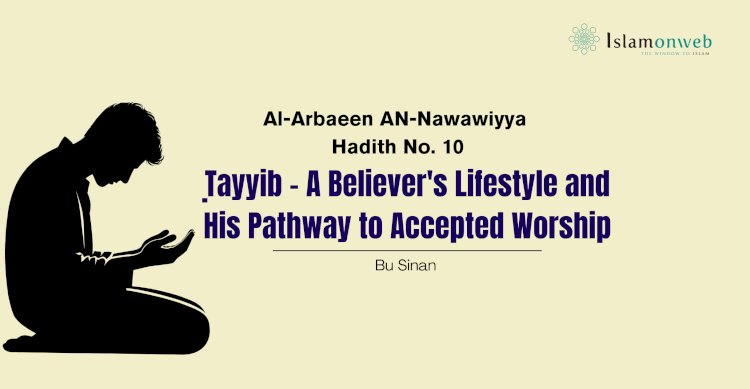


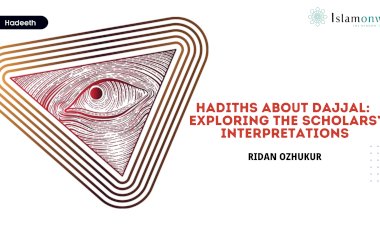
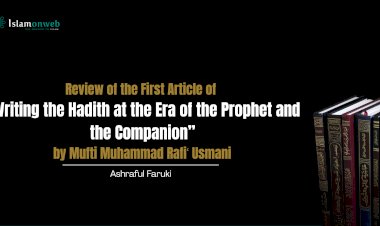


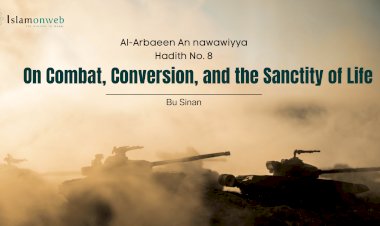
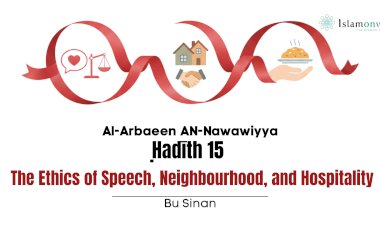














Leave A Comment